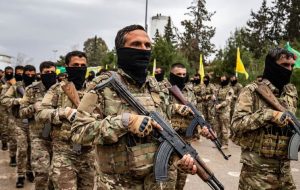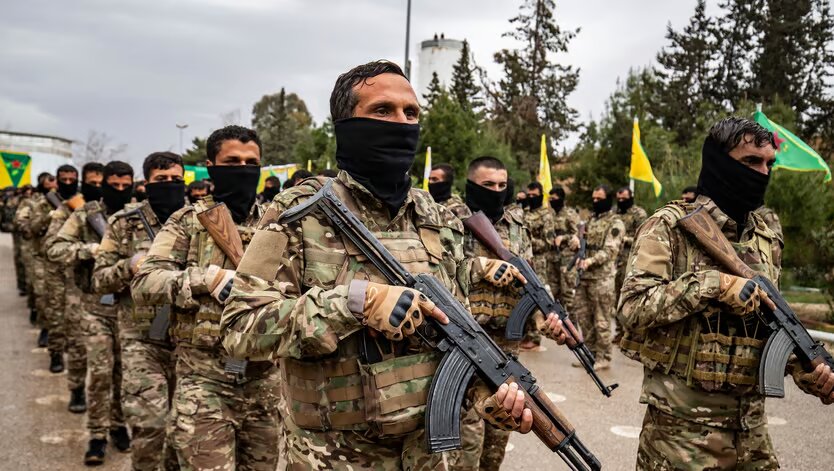Why is Washington keen to nurture Syrian Kurds?
BEIRUT – Upon assisting Israel’s security and political challenges, following the Lebanon war and the fall of the Bashar al-Assad government, Foreign Minister Gideon Sa’ar stated, “In a region where we will always be a minority, we must ally with other minorities.” Sa’ar added that the Kurds are “a great nation but they do not


BEIRUT – Upon assisting Israel’s security and political challenges, following the Lebanon war and the fall of the Bashar al-Assad government, Foreign Minister Gideon Sa’ar stated, “In a region where we will always be a minority, we must ally with other minorities.” Sa’ar added that the Kurds are “a great nation but they do not enjoy political independence.”
During his meeting with Jens Ploetner, the German chancellor’s special adviser on foreign and security policy on December 18, Sa’ar also stressed that “the international community has a role in protecting minorities in Syria, including the Kurdish minority, which is being attacked and threatened these days.”
Fearing the growing role of former Egyptian President Gamal Abdel Nasser in the 1950s, David Ben-Gurion formulated the Torat Haperipheria doctrine based on the advice of the Zionist theorist Eliyahu Sasson.
Tel Aviv accordingly allied with Turkey; the Pahlavi regime in Iran; the Christian minorities in Ethiopia and southern Sudan; the Druze in Syria and Lebanon; the Kurds in Iraq; and the Maronite Christians in Lebanon.
When the Kurds in Iraq tried to secede, Tel Aviv -in cooperation with the Pahlavi regime- supported them. Mulla Mustafa Barzani, the Kurdish leader, met with Israeli officials in the occupied territories in 1968 and 1973.
In 2003, after the fall of Saddam Hussein’s regime and the granting of autonomy to the Kurds within the Iraqi state, Kurdish-Israeli relations expanded.
Today, not only the Israeli occupation regime but Turkey has undeniable hegemonic ambitions in Syria. That is why Ankara has rushed to strengthen its relations with Ahmed al-Sharaa (al-Julani).
However, the Turkish opposition is warning that Erdogan’s policy, since his intervention in Syria in 2011, will push Israel further towards the Turkish border.
In the meantime, the political factions in the Iraqi Kurdistan have welcomed the initiative of Devlet Bahceli, the head of Turkey’s Nationalist Movement Party to release Abdullah Ocalan, the leader of the Kurdistan Workers’ Party (PPK).
Bahceli’s initiative urges the release of Ocalan on condition that he dissolve his party. The initiative is expected to boost the Kurdistan region’s economy as the volume of trade exchange with Turkey may exceed $20 billion annually, according to experts.
On October 9, 1998, Ocalan fled to Syria and Greece, then to Russia and Italy, and then to the Greek embassy in Kenya, where the US and Israeli intelligence forces handed him over, to Turkey on February 14, 1999. Turkey sentenced him to life in prison.
The PPK leader is held in solitary confinement in the Imrali prison, a high-security detention center on the island of Imrali, in the Sea of Marmara in Turkey.
For five years, he was forbidden from holding any meetings, even with his lawyers. Nevertheless, Ocalan recently met two leaders of the “People’s Democracy and Equality Party,” to whom he reiterated that he was ready for dialogue in a bid to “reach a political and peaceful solution.”
Bahceli’s initiative reflects Turkey’s serious concerns, particularly in the aftermath of Israel’s encroachment in Syria.
According to Ocalan, “The events in Gaza and Syria revealed the failure to solve the problems that were exacerbated by foreign interventions.”
Seemingly, Turkey seeks to cooperate with Ocalan to remove the PPK’s cadres from Syria and dissolve it in Qandil. This would enable it to get rid of the Syrian Democratic Forces (SDF) as it has rejected what Mazloum Abdi, the SDF commander-in-chief, proposed regarding “Operation Dawn of Freedom,” which targeted Kobani east of the Euphrates after Tal Rifaat and Manbij.
Abdi proposed demilitarizing Kobani, and expressed readiness to deport the foreign fighters, including the PKK’s cadres. He further confirmed that he is for the unity of Syria and is ready to merge the SDF into the Syrian army.
The rise of the SDF coincided with the increase in the number of US forces in Syria in 2015 under the pretext of confronting ISIS.
The SDF has become as important as the US military bases aiming at preventing the presence of any competitor in the region, in addition to ensuring Israel’s dominance in the region.
It is worth noting that Turkey is counting on Ahmed al-Sharaa not to uphold any solution that contradicts its strategic ambitions.
During a press conference with Turkish Foreign Minister Hakan Fidan, Ahmed al-Sharaa stressed that he prefers Syria without the SDF. In contrast, Washington supports integrating it into the new regime.
Ahmed al-Sharaa also stressed that the Kurds are an integral part of Syria, hinting that he will not allow it to become a point of operation for the PPK.
Meanwhile, Washington has extended sanctions on Syria until 2029, coinciding with the increase in the number of its colonial soldiers from 900 to 2,000 soldiers, indicating that it will shape Syria according to its interests.
Until Trump’s inauguration on the 20th of this month, the course of his policy will only pressure all regional parties to ensure Israeli interests. Some expect him to engage in direct dialogue with Turkey after it has become the main player on the Syrian scene.
Observers believe that Turkey took the initiative to reconcile with Ocalan – two months before the events in Syria – as it was not only aware in advance of the plan to topple the al-Assad government, but also contributed to it.
Hence, Turkey needs to contain the PPK whose leaders in northern Iraq are anticipating Trump’s policy before responding to Ocalan’s initiative.
In 2012, Ahmet Davutoglu, then Turkish Foreign Minister, ordered the Kurds to rebel against Assad in exchange for recognizing their autonomy or federal rule in the new Syria, but Turkey may back down in light of the unpredictable and accelerating changes.
Obviously, the federalization of the region is one of the most important factors necessary to ensure the US-Israeli hegemony. While Turkey will not accept any strong Kurdish role on its borders, the US deems the new Syrian regime as a means to cut off supply routes to Hezbollah.
Thus, Washington may be obliged to go along with Turkey and integrate the Kurds within the structure of the new Syrian state. This does not mean the demise of Kurdish ambitions that may arise in the future, given its importance in serving the US imperialist interests.
